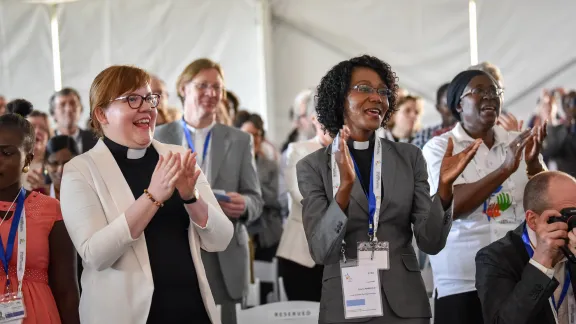Welcome to the Thirteenth Assembly, the principal authority of the LWF
An Assembly is the highest decision-making body of the LWF. In addition to celebrating the common faith of the Lutheran communion across contexts and cultures, the Assembly offers mutual enrichment through joint reflection and discernment, and provides the platform for joint decision-making. As the principal authority of the LWF, the Assembly is the most representative expression of the LWF communion. Delegates from all member churches take part. The outcomes and decisions will lay the ground for the work of the LWF in the coming six to seven years.

Gaining the energy from an ecclectic array of global music, at the Lutheran World Federation's Twelfth Assembly. Windhoek, Namibia, May 2017. Photo: LWF/Albin Hillert
- What is an Assembly?
- Journey toward the Assembly
- Core Functions
- Size and composition
- Assembly outcomes
The Thirteenth Assembly is hosted by The Evangelical Church of the Augsburg Confession in Poland, which takes place from 13 to 19 September 2023, in the southern city of Krakow. We thank the church for their hospitality. Each Assembly is grounded in scripture. This Assembly has the theme “One Body, One Spirit, One Hope”, in reference to Ephesians 4:4: “There is one body and one Spirit, just as you were called to the one hope of your calling.” The LWF extends a warm welcome to delegates, ex-officio participants, ecumenical and faith partners, media, and those member churches observing the Assembly from afar.
The work of an Assembly begins well in advance of the formal event. Prior to an Assembly, LWF member churches in their respective regions hold pre-Assembly meetings. These are important spaces for spiritual reflection, relating the Assembly themes to different church contexts, and provide opportunity to build community. A major role of the regional pre-Assemblies is to designate a slate of member church representatives from the region to be nominated to serve on the new LWF Council.
Global gatherings in a Women’s pre-Assembly, Men's pre-Assembly and Youth pre-Assembly are also held. Delegates receive training on the rules and procedures for taking part in debates, decision-making and voting at the Assembly.
The LWF Assembly is momentous and produces a substantial body of work that sets the course for the direction of the work of the LWF until the next Assembly. Moreover, the Assembly is responsible for the LWF Constitution; elects the President and members of the Council, which governs the LWF between Assemblies; and acts on the reports of the President, General Secretary and Chairperson of the Finance Committee.
It carries out another no less important function. The Assembly seeks to empower the Lutheran communion in its witness and service in the coming years, and to support the communion to learn and reflect upon the local and regional context of the host country. The Assembly normally meets every six years with the date, venue and program determined by the Council.
The LWF Council determines the number of delegates and their distribution among the member churches, giving regard to the size of member churches and distribution by continent and country. Each member church has the right to have at least one representative in the Assembly. Each region is represented by at least 40 percent women, 40 percent men and 20 percent youth. The LWF strives to uphold a balance between lay and ordained delegates. Other participants may speak in deliberations conducted in plenary but only delegates enjoy the twin rights of voice and vote.
Around 350 delegates are expected to gather for the Thirteenth Assembly. Prior to the Assembly, a Council meeting, the youth, men and women’s pre-Assemblies, and pre-Assembly visits will take place.
The Assembly will generate a series of formal documents that articulate the position of the LWF on crucial Communion, ecumenical and global concerns. The three bodies of work are as follows:
- The Assembly Message, which describes and represents the experience of the Assembly, and provides collective memory of a historical event in the life of the Lutheran communion
- Assembly Resolutions, which provide general direction for the life and work of the LWF within the context of the strategic plan and resources
- Assembly Public Statements, which describe particular issues or concerns, and the position of the Assembly on that issue. Public statements are intended for widespread public release.
